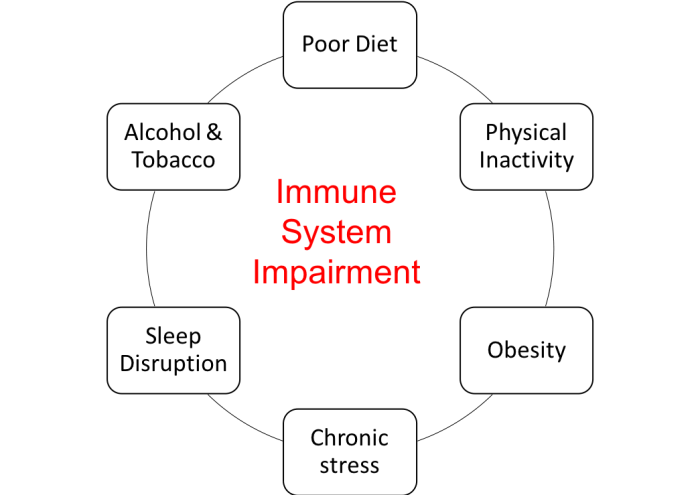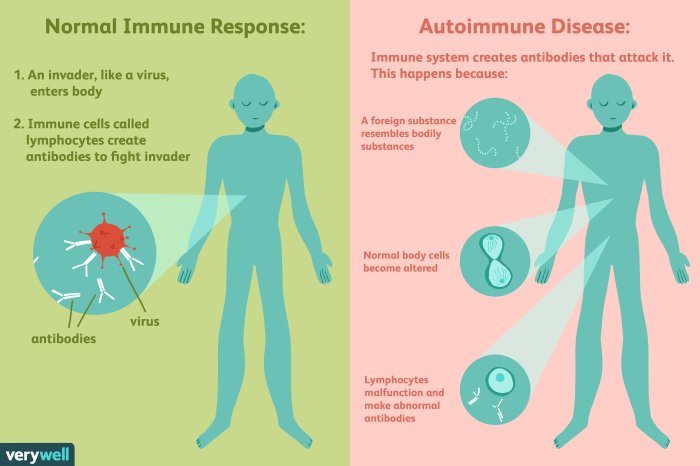Irritability cognitive impairment and impaired immune system – The interplay of irritability, cognitive impairment, and impaired immune system is a complex and multifaceted topic that has garnered significant attention in recent years. This article delves into the intricate relationship between these three factors, exploring their causes, symptoms, and potential treatments.
Irritability, cognitive impairment, and impaired immune system are often interconnected, forming a vicious cycle that can significantly impact an individual’s overall health and well-being. Understanding the nature of this relationship is crucial for developing effective strategies to mitigate its negative effects.
Irritability

Irritability is a common symptom of many mental health conditions, including depression, anxiety, and bipolar disorder. It can also be a side effect of some medications. Irritability is characterized by a feeling of anger, frustration, or impatience. People who are irritable may be easily annoyed or upset, and they may have difficulty controlling their temper.
Causes of Irritability
There are many different factors that can contribute to irritability, including:
- Mental health conditions, such as depression, anxiety, and bipolar disorder
- Physical health conditions, such as chronic pain, fatigue, and hormonal changes
- Medications, such as antidepressants and steroids
- Stress
- Lack of sleep
Symptoms of Irritability, Irritability cognitive impairment and impaired immune system
Irritability can manifest in a variety of ways, including:
- Feeling angry, frustrated, or impatient
- Being easily annoyed or upset
- Having difficulty controlling your temper
- Snapping at others
- Having difficulty concentrating
- Feeling tired or run down
Managing Irritability
There are a number of things you can do to manage irritability, including:
- Identifying and avoiding triggers
- Getting regular exercise
- Eating a healthy diet
- Getting enough sleep
- Practicing relaxation techniques
- Talking to a therapist
Cognitive Impairment

Cognitive impairment is a decline in cognitive function that can affect memory, attention, and reasoning. It can be caused by a variety of factors, including aging, dementia, and traumatic brain injury.
Definition of Cognitive Impairment
Cognitive impairment is defined as a decline in cognitive function that is significant enough to interfere with everyday activities. This decline can affect a variety of cognitive domains, including:
- Memory
- Attention
- Reasoning
- Language
- Executive function
Examples of Cognitive Impairment
Cognitive impairment can manifest in a variety of ways, including:
- Difficulty remembering names, dates, and events
- Difficulty paying attention and concentrating
- Difficulty making decisions and solving problems
- Difficulty understanding and using language
- Difficulty planning and organizing
Treatments for Cognitive Impairment
There is no cure for cognitive impairment, but there are a number of treatments that can help to slow its progression and improve symptoms. These treatments include:
- Medications
- Cognitive rehabilitation
- Lifestyle changes
Impaired Immune System

The immune system is a complex network of cells, tissues, and organs that work together to protect the body from infection. When the immune system is impaired, it can make the body more susceptible to illness.
How Irritability Affects the Immune System
Irritability can have a negative impact on the immune system by:
- Increasing inflammation
- Reducing the production of immune cells
- Impairing the function of immune cells
How Cognitive Impairment Affects the Immune System
Cognitive impairment can also have a negative impact on the immune system by:
- Reducing the ability to recognize and respond to pathogens
- Impairing the production of immune cells
- Increasing the risk of infection
Ways to Strengthen the Immune System
There are a number of things you can do to strengthen your immune system, including:
- Eating a healthy diet
- Getting regular exercise
- Getting enough sleep
- Reducing stress
- Taking supplements
Interrelation of Irritability, Cognitive Impairment, and Impaired Immune System: Irritability Cognitive Impairment And Impaired Immune System
Irritability, cognitive impairment, and impaired immune system are all interconnected. Irritability can lead to cognitive impairment, which can then lead to an impaired immune system. Conversely, an impaired immune system can lead to irritability and cognitive impairment.
Relationship between Irritability and Cognitive Impairment
Irritability and cognitive impairment are often comorbid, meaning that they occur together. This is because irritability can lead to cognitive impairment by:
- Interfering with attention and concentration
- Making it difficult to learn and remember new information
- Impairing decision-making and problem-solving
Connection between Cognitive Impairment and a Weakened Immune System
Cognitive impairment can also lead to a weakened immune system by:
- Reducing the ability to recognize and respond to pathogens
- Impairing the production of immune cells
- Increasing the risk of infection
How Irritability Can Impact the Immune System
Irritability can also have a direct impact on the immune system by:
- Increasing inflammation
- Reducing the production of immune cells
- Impairing the function of immune cells
General Inquiries
What are the common causes of irritability?
Irritability can be caused by various factors, including stress, anxiety, depression, hormonal imbalances, and certain medical conditions.
How can I manage irritability?
Effective strategies for managing irritability include exercise, relaxation techniques, cognitive behavioral therapy, and addressing underlying medical conditions.
What are the symptoms of cognitive impairment?
Cognitive impairment can manifest as difficulties with memory, attention, problem-solving, and decision-making.
How can I strengthen my immune system?
Maintaining a healthy lifestyle, including a balanced diet, regular exercise, and adequate sleep, is essential for a strong immune system.